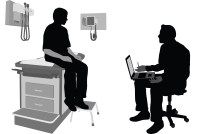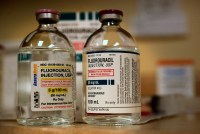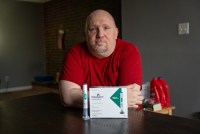Latest KFF Health News Stories
Arkansas Led the Nation in Measuring Obesity in Kids. Did It Help?
For more than 20 years, children in Arkansas have been measured in school as part of a statewide effort to reduce childhood obesity. But the letters have had no impact on weight loss — and obesity rates have risen. Still, the practice of sending letters has spread to other states.
Cada vez mueren más menores por sobredosis. ¿Podrían los pediatras ayudar más?
La Academia Americana de Pediatría recomienda ofrecer buprenorfina a los adolescentes adictos a los opiáceos. Sin embargo, según los resultados de una encuesta, solo el 6% de los pediatras informa haberlo hecho alguna vez.
More Kids Are Dying of Drug Overdoses. Could Pediatricians Do More to Help?
The surge in overdose deaths among teens is opening a new path to treatment: pediatricians. A doctor in Massachusetts shows how it works with a 17-year-old patient.
The Burden of Getting Medical Care Can Exhaust Older Patients
It’s estimated that an older patient can spend three weeks of the year getting care — and that doesn’t count the time it takes to arrange appointments or deal with insurance companies.
Adultos mayores, agotados por tener que organizar tanta atención médica
Un nuevo estudio revela que los pacientes de Medicare dedican aproximadamente tres semanas al año a hacerse pruebas médicas, ver a doctores, someterse a tratamientos o procedimientos médicos, o pasar tiempo en el hospital o en centros de rehabilitación.
Overdosing on Chemo: A Common Gene Test Could Save Hundreds of Lives Each Year
The FDA and some oncologists have resisted efforts to require a quick, cheap gene test that could prevent thousands of deaths from a bad reaction to a common cancer drug.
Health Workers Fear It’s Profits Before Protection as CDC Revisits Airborne Transmission
Four years since the covid pandemic emerged, health care workers want rules that protect them during outbreaks. They worry the CDC is repeating past mistakes as it develops a crucial set of guidelines for hospitals, nursing homes, prisons, and other facilities that provide health care.
California Lawsuit Spotlights Broad Legal Attack on Anti-Bias Training in Health Care
State laws requiring doctor training on how bias affects treatment violate teachers’ right to free speech, opponents say.
Early Detection May Help Kentucky Tamp Down Its Lung Cancer Crisis
After a decade of work, a Kentucky program launched to diagnose lung cancer earlier is beginning to change the prognosis for residents by catching tumors when they’re more treatable.
States Target Health Insurers’ ‘Prior Authorization’ Red Tape
Doctors, patients, and hospitals have railed for years about the prior authorization processes that health insurers use to decide whether they’ll pay for patients’ drugs or medical procedures. The Biden administration announced a crackdown in January, but some state lawmakers are looking to go further.
California Offers a Lifeline for Medical Residents Who Can’t Find Abortion Training
Abortion restrictions in 18 states have curtailed access to training in skills that doctors say are critical for OB-GYN specialists and others. A new California law makes it easier for out-of-state doctors to get experience in reproductive medicine.
Rising Malpractice Premiums Price Small Clinics Out of Gender-Affirming Care for Minors
Even in states where laws protect minors’ access to gender-affirming care, malpractice insurance premiums are keeping small and independent clinics from treating patients.
Older Americans Say They Feel Trapped in Medicare Advantage Plans
As enrollment in private Medicare Advantage plans grows, so do concerns about how well the insurance works, including from those who say they have become trapped in the private plans as their health declines.
States Expand Health Coverage for Immigrants as GOP Hits Biden Over Border Crossings
More than 1 million immigrants, most lacking permanent legal status, are covered by state health programs. Several states, including GOP-led Utah, will soon add or expand such coverage.
‘Financial Ruin Is Baked Into the System’: Readers on the Costs of Long-Term Care
Thousands of people shared their experiences and related to the financial drain on families portrayed in the “Dying Broke” series, a joint project by KFF Health News and The New York Times that examined the costs of long-term care.
“Peor de lo que la gente cree”, cambios en Medicaid crean caos en los estados
Tanto beneficiarios como defensores de pacientes dicen que los funcionarios de Medicaid enviaron formularios de renovación obligatoria a direcciones viejas, calcularon mal los niveles de ingresos e hicieron malas traducciones de los documentos.
‘Worse Than People Can Imagine’: Medicaid ‘Unwinding’ Breeds Chaos in States
As Medicaid programs across the nation review enrollees’ status in the wake of the pandemic, patients struggle to navigate the upheaval.
Start Shopping: Enrollment Begins Nov. 1 for Most Obamacare Insurance Plans
More than 16 million Americans who buy their own health insurance through state and federal marketplaces have until Jan. 15 to compare prices, change their coverage, or enroll for the first time.
Storing Guns Away From Home Could Reduce Suicides, but Legal Hurdles Loom
Safe storage maps show gun owners where to put their firearms for safekeeping if they experience a mental health crisis. The idea has support among some gun enthusiasts, but legal obstacles threaten wider adoption.
Quick Genetic Test Offers Hope for Sick, Undiagnosed Kids. But Few Insurers Offer to Pay.
A new, rapid genetic test shows promise in increasing diagnoses and improving treatment for some children with rare genetic conditions. Many insurers won’t cover it, but Florida’s Medicaid program is among those that see benefits — and, potentially, savings.























